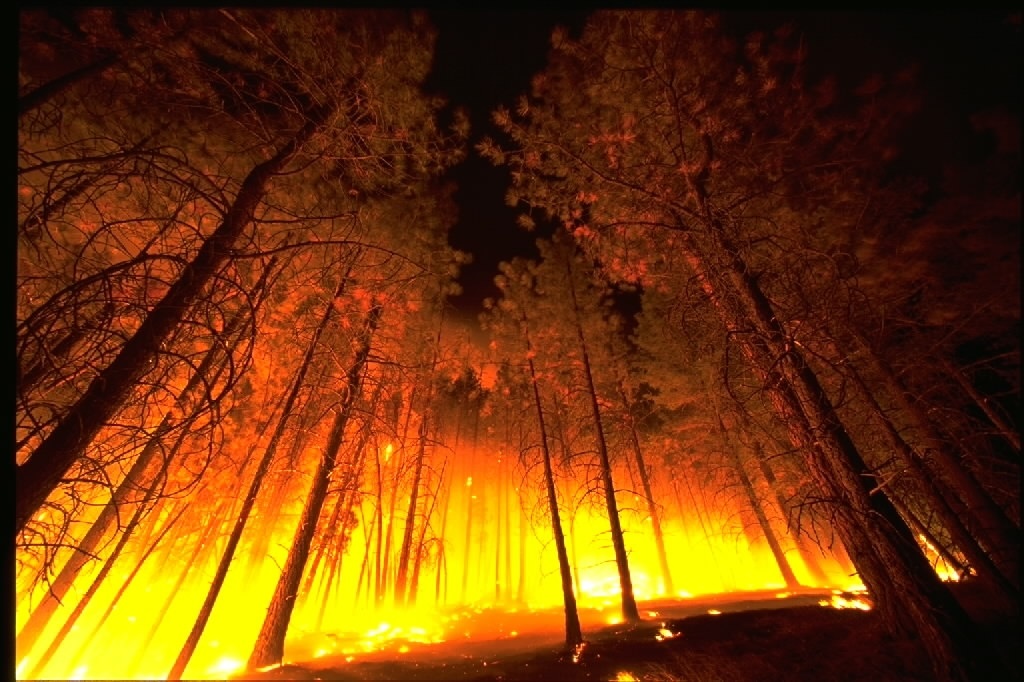 Photo Courtesy of U.S. Department of Agriculture on Wikimedia Commons
Photo Courtesy of U.S. Department of Agriculture on Wikimedia Commons
Five Things You Need to Know About The “Global Ecological Catastrophe” Happening In Russia
Russia has declared a state of emergency in four Siberian regions (Irkutsk, Buryatia, Sakha and Krasnoyarsk) after wildfires spread this week to 2.7 million hectares (10,400 square miles) of forest. The size of this area has been compared to the area of annexed Crimea, Massachusetts, or Belgium. Wildfires have plagued Russia for years, and Siberia is particularly vulnerable. In 2010, catastrophic damage from wildfires caused $58 billion in damages and devastated the country’s crops to the point where the Kremlin placed a ban on grain exports. The 2015 fires in southern Siberia killed 33 people, left 6,000 homeless, and were able to be seen from space. Scientists have long been concerned about the growing number and regularity of wildfires occurring in Siberia, calling the increase in fires “unprecedented.” This week’s fires are the most disastrous yet.
1. The Fires Have Already Caused Devastating Effects for Thousands of Russians
Cities and towns throughout Siberia and the Far East are shrouded in thick layers of smoke. One report estimates that the fires are currently affecting about 800 communities throughout Western Siberia and the Altai region. Smoke has reportedly reached as far as the Urals, blanketing cities in dense clouds of smog. This has created a perilous situation for specific segments of the public, such as the elderly and asthmatic, who are particularly susceptible to health problems arising from poor air quality. If the blazes are not contained, smoke could reach as far as Moscow, endangering the city’s population of 11.92 million.
2. This Is the New Normal: Climate Change Will Make Wildfires Worse and More Common
While the most recent blazes are unique in extremity and scope, their occurrence will likely become commonplace in coming years due to climate change’s effects. Their severity will also increase due to changes in global temperature and moisture level. The fires in Siberia were triggered by a combination of high temperatures, strong winds, and dry thunderstorms. According to a new study, these dynamics will worsen as climate change causes temperatures to rise and precipitation levels to fall. Climate change’s effects essentially turn forests “into kindling,” causing massive blazes that spread rapidly, cause rampant destruction, and are difficult to contain.
3. Wildfires In-Turn Cause A Climate Feedback Loop, Emitting C02 and Melting Ice
The impact that the fires will have on the global climate situation is even more concerning, such that the event is being called a “global ecological catastrophe.” According to environmental research, large-scale wildfires release significant C02 emissions at a level comparable to emissions created by major cities. Furthermore, the soot and ash produced by the flames exacerbates global warming by reducing the reflectiveness of snow and ice, thus trapping more heat. This will accelerate the melting of the Arctic. Aside from the environmental issues arising from arctic ice loss, quicker melting will further complicate the difficult U.S.-Russia national security interests in the region.
4. The Russian Government’s Slow Response Has Elicited Public Outcry
Large-scale government response to the disaster was slow. The wildfires swept across millions of acres on July 25, but the Kremlin did not take any action until nearly a week later. Due to rising pressure to act, Putin finally ordered the mobilization of military planes and helicopters on Wednesday. This delay in government response sparked indignation among the Russian public, due what they perceived as officials’ lack of concern for the severity of the situation. Governor of Krasnoyarsk Alexander Uss said that the fires were “a normal natural phenomenon” and that to combat them was “pointless.” Russian citizens immediately expressed outrage, with more than half a million signing a petition demanding government action to address the ecological disaster. People also turned to social media to cry for help, with the Russian twitter hashtag #потушитепожарывсибири (#putoutsiberianwildfires) trending in the number one spot on Friday.
5. The U.S. Has Offered Help, Setting a Possible Precedent for Future Collaboration
President Trump has offered Putin assistance in combating the fires. According to the Kremlin’s official statement, Trump proposed American help during a phone call between the two leaders on Wednesday evening. While Putin “expressed sincere gratitude” and said he would accept the offer if needed, he assured Trump that at the moment, external aid was not necessary. The presidents agreed to remain in contact as the situation develops. Trump’s offer to assist with the Kremlin’s management of the Siberian wildfires has raised eyebrows among the American public, given his past remarks about the California wildfires last year, when he suggested that the state government was to blame. However, Trump’s extension of aid and Putin’s warm response show how cooperation on this issue could set a precedent for future U.S.-Russia partnerships in the area of disaster relief and environmental issues





